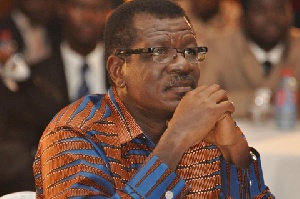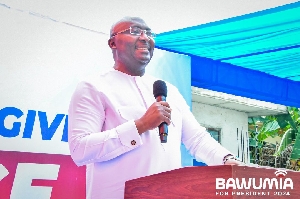- Home - News
- TWI News | TV
- Polls
- Year In Review
- News Archive
- Crime & Punishment
- Politics
- Regional
- Editorial
- Health
- Ghanaians Abroad
- Tabloid
- Africa
- Religion
- Election 2020
- Coronavirus
- News Videos | TV
- Photo Archives
- News Headlines
- Press Release
Opinions of Saturday, 2 July 2016
Columnist: Bright Simons
Ghana and the 'Otabil Effect' theory
Half a decade ago, I started to use the term, 'Otabil Effect', to describe certain trends I saw in the emergence of an 'aspirational class' in Ghana.
It therefore comes as no surprise to me that Pastor Mensa Otabil has for two consecutive years now been branded as 'Ghana's Most Influential' person by a well-known media network. The development is consistent with Ghanaian attitudes of recent times.
Yesterday, at an event in Accra to mark Pastor Otabil's latest 'coronation', he delivered a lecture in which he lamented the excessive focus on politicians (not 'politics', mind you) and the sad neglect of many aspects of our lives by the media and the chattering industry.
To his mind this has created an 'illusion of power' around politicians, which from repeated projection has now become self-fulfilling.
By constantly hanging onto their every word we have created the conditions for politicians to occupy our headroom and to fund their distractions at our expense.
I think he is right to an extent. And the same situation is similar to varying degrees across Africa. He did not proceed further to diagnose the source of this behavior. I think I should venture a hypothesis.
Most African countries acquired their national identity either through colonisation and decolonisation or wars or other forms of struggle for independence. Because political emancipation favours the narratives of politicians; the first set of dominant influencers in Africa were politicians.
But a nation is not only a material project of armies and roads and national currencies. It is at its roots a project of ideas: of national identity, values, founding myths, ideology and institutions. So, to be effective, and not for a small measure of convenience, the early political leaders also assumed the mantle of 'thought leaders' in addition to being 'material leaders'.
Not only was it the mandate of the 'first leaders' to build dams and metal foundries, schools and hospitals, football teams and cultural monuments, it was also their duty to teach us which aspects of our history was relevant to our identity, which poems made us patriotic, and which philosophical lens to use in interpreting poverty.
Unfortunately for us, these 'two poles of power' were never separated. Material power continued to be fused with thought power, and today, the followers of political leaders in Africa still expect that in respect of ideas, these leaders should be generators of the best rather than merely studious followers of the wise.
This is of course more conclusively true of modern African nations and not necessarily of all African polities that have emerged since prehistory (think of thought leaders like Imhotep and Nefer in Ancient Egypt).
It is my contention that in many other societies, a clear split between material and thought power is guarded to the point where a political leader who does not recline on the ideas of other sages and claims to have original wisdom about any matter would simply be laughed out of the podium.
It is a requirement lightly dispensed in these more prosperous and sophisticated societies that a political leader MUST have a guru, or a number of them, and that she - the politico - must reference every idea to other thinkers.
This accounts for the possibility of such phenomena as 'powerful economists' and 'influential philosophers' in a way that often mean that such sages/thought leaders command mass attention (rather than merely benefit from patronage).
I daresay that the phenomenon of a 'Jeffrey Sachs', an 'Anthony Giddens' or a 'Bernard Henri Levy' is not viable in most of Africa. Unless they directly seek to acquire material political power (like an Achebe or a Soyinka), there is virtually no room for any kind of concession of power to the 'thought leader'.
In such a society, 'material power' is all the power conceivable. It is very hard then to fantasise of a Ghana in which politicians command less 'mass attention' than they do now. Perhaps, that is why we are beginning to explore this beguiling idea of 'influence'.











